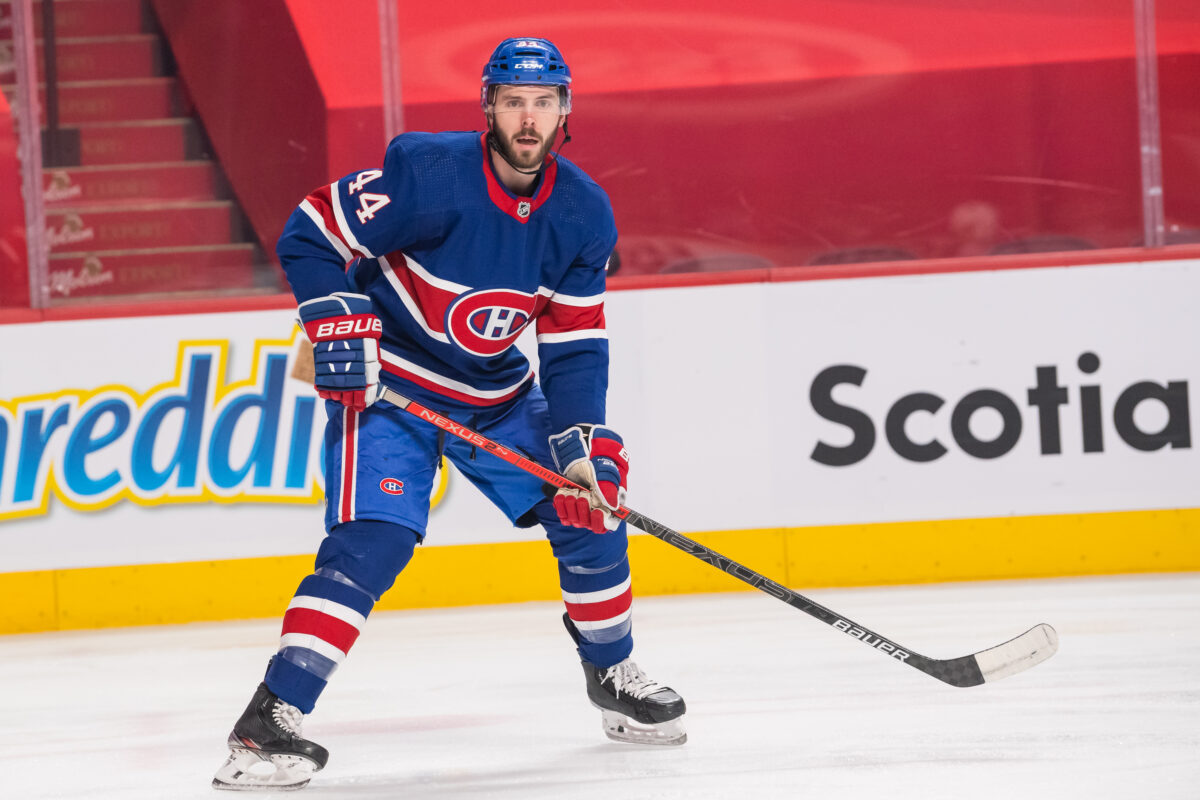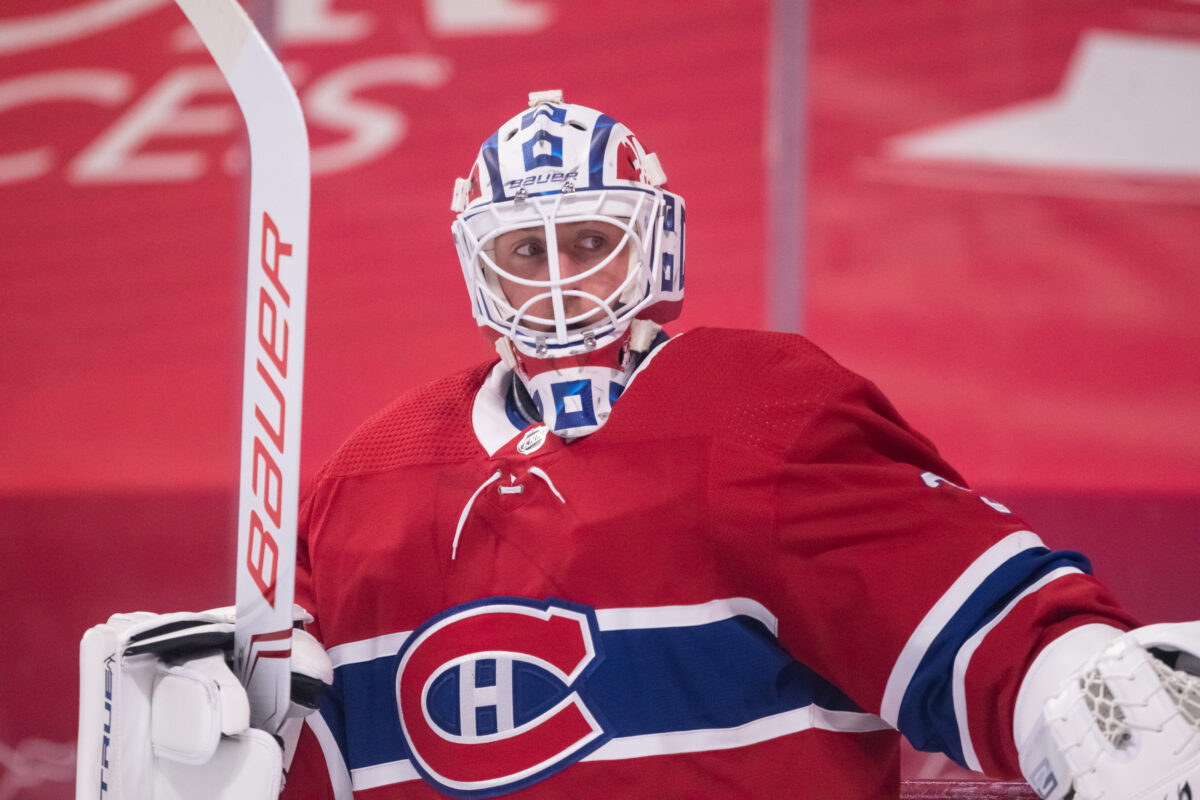Looking ahead to the upcoming Montreal Canadiens season, defence will be a major issue. With a team in a rebuild, there is no surprise to see areas on the roster that will be exposed due to a lack of experience and depth. This doesn’t mean there can’t be a path to improvement, but the expectations must remain realistic.
Head coach Martin St. Louis and his staff will be mainly focused on individual player development, but part of that job will rely on providing in-game situations that can help that along. For those beneficial situations, the Canadiens will need to improve defensively to create close, competitive games that will allow the youth to learn when to attack, pinch in or fall back and defend. How to play to defend a one-goal lead, or try to score to tie the game late in the third period. To do that, the Canadiens will need to find a way to improve defensively. Realistically, what can that look like?
Montreal’s Blue Line
There has been massive turnover on the Canadiens’ roster, especially on defence. There will be no Shea Weber, Jeff Petry, or Ben Chiarot. That trio was the backbone of the blue line that led the team to a Stanley Cup Final; all are now gone via trades. As a result, injuries will play a significant role this season for a team lacking depth in goal and on the blue line.
This season’s blue line is still not set in stone, however, it will rely heavily on Joel Edmundson. It may be unfair to place the burden of leading this defence corps onto the shoulders of someone who is seen as a second pairing defender, but he will be relied upon to provide stability on the backend for a young and fragile defence. His leadership and professional attitude will be what the organization will want to provide the young players that will be put into the NHL lineup.

The other regulars are puck-movers Mike Matheson and Chris Wideman along with stay-at-home style defender, David Savard. The competition among the youngsters is where things will get interesting for the fans, as Kaiden Guhle, Jordan Harris, Justin Barron, and even Arbor Xhekaj will be battling for a regular NHL job. Their play will not be steady and will lead to some goals against, but how that development is approached will be the main job of the Canadiens’ coaching staff this season.
New Canadiens Leadership
A positive outcome for the team’s defence this season would simply be a slight statistical improvement over last season. While the bar isn’t set high on that expectation, it starts with new defensive coach Stephane Robidas. His approach to that improvement will have to include the development of the up-and-coming young defenders and his ability to communicate with veterans as well.
“My role will primarily be to develop the Canadiens’ young defensemen. I know there are good veterans on the roster, too. The vision is really to help the young guys. The game has evolved a lot in recent years, and I fit into that change when it comes to puck possession, practice style, and small-area games. I believe in those things, too. It’s a perfect match.”
–Stephane Robidas
As an organization, the Canadiens have begun their modernization to the style of defence corps that provides success in the NHL. That is a modern puck-moving group that focuses on quick puck recovery and movement to generate a transition game, offensive puck possession and scoring opportunities stemming from the rush.
Related: Canadiens’ Hiring of Robidas Shows Focus on Player Development
Even if this style, more consistent with other NHL teams, is the one used, it will take time for the players to adjust. We may witness more youth and mobility this season, but that comes with its challenges, which will mean errors, and likely a defence that will finish in the bottom third of the standings in all metrics. Robidas’ approach will need to provide development opportunities while finding a plan to improve on the NHL’s 27th-ranked penalty-kill that finished with a 75.6 percent efficiency rating last season.
As hopeful as fans can be with the arrival of Robidas, the Canadiens’ defensive output will not be significantly improved over last season. The best hope for the defence to help cut back on the 317 goals allowed (GA) last season is for the shots allowed per game by Montreal to be cut down from the 30th-ranked 34.4 shots per game average (SPGA). Even a small improvement to only 32 SPGA would have a large impact. With a defence that will be expecting so many shots on goal, goaltending will play a significant role if the Canadiens are to improve their overall defensive game from last season, and provide fans with a team that can play an entertaining, yet competitive style every night.
Canadiens Need Goaltending
The biggest question the Canadiens will face is whether Carey Price will be able to play and if so, will it be for a full season? Even if he can step in and play, the expectation on him can’t be for him to return to the elite level he provided in the past. With the injury history and the fact that he is now 35 years old, he is no longer in his prime years and is going through the natural progression of aging, which will cause his play to begin its natural downward slide. It will be impossible to make an educated guess on what level of play he will meet, or what impact that can have throughout a full season.
The hope is for Price to start over half of the games next season, moving Jake Allen into the role of backup that he was originally acquired to fill. Barring that, Allen can be a reliable starter if healthy. Last season, he did suffer through some injuries that cut him down to only 35 starts with a .905 save percentage (SV%). In those games, he faced 1,123 shots, allowing 107 GA. If the Canadiens’ defence can cut the SPGA down to 32, and Allen can return to his career average of .911 SV% that would mean that he would allow 117 goals over 41 starts on average.

Samuel Montembeault was a necessary waiver acquisition last season due to the salary cap and injury issues. While he is only seen as an insurance policy to play a backup role in the event Price cannot play, he can provide some respectable play if matched up against weaker NHL teams, as well as a much smaller workload. Expectations on what he can provide must be kept realistic though, as he finished the year with a career-high 38 starts. During that time, he had a .891 save percentage, which is nearly identical to his career average of .892. If he were to start as many as 41 games, using 32 SPGA and his career average SV%, he would allow 142 GA.
Without Price, and expecting a slight improvement in defence and goaltending due mostly to a healthier lineup, the numbers would show a marked improvement on the team’s overall defence. With a total of 259 GA, that would represent a cut of 58 GA from last season, which would have placed Montreal 21st in GA last season.
Even if this all comes to pass, the Canadiens will most likely still be one of the first 10 teams stepping to the podium at the 2023 Draft. Simply by focusing on a slightly better defensive structure based on mobility, and goaltenders who can return to their career averages, the outcomes for this season will be improved over last year. That being said, the main focus will be on individual player development. This won’t work against overall team improvement, however, they can still strive to improve on last season’s debacle to help build toward a new winning culture while also focusing on developing the youth.